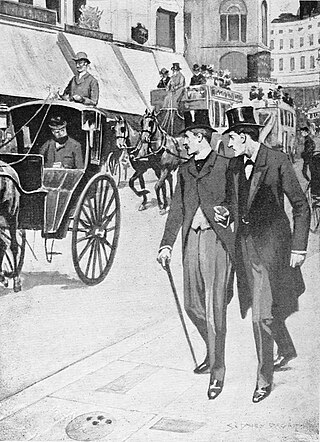Related Research Articles

Laudanum is a tincture of opium containing approximately 10% powdered opium by weight. Laudanum is prepared by dissolving extracts from the opium poppy in alcohol (ethanol).

William Wilkie Collins was an English novelist and playwright known especially for The Woman in White (1859), a mystery novel and early sensation novel, and for The Moonstone (1868), which established many of the ground rules of the modern detective novel and is also perhaps the earliest clear example of the police procedural genre.

Thomas Penson De Quincey was an English writer, essayist, and literary critic, best known for his Confessions of an English Opium-Eater (1821). Many scholars suggest that in publishing this work De Quincey inaugurated the tradition of addiction literature in the West.

The Moonstone: A Romance by Wilkie Collins is an 1868 British epistolary novel. It is an early example of the modern detective novel, and established many of the ground rules of the modern genre. Its publication was started on 4 January 1868 and was completed on 8 August 1868. The story was serialised in Charles Dickens’s magazine All the Year Round. Collins adapted The Moonstone for the stage in 1877.

The Mystery of Edwin Drood is the final novel by the English author Charles Dickens, originally published in 1870.
Moonstone may refer to:
The sensation novel, also sensation fiction, was a literary genre of fiction that achieved peak popularity in Great Britain in the 1860s and 1870s, centering taboo material shocking to its readers as a means of musing on contemporary social anxieties.
Grevel Charles Garrett Lindop is an English poet, academic and literary critic.

The gentleman detective, less commonly lady detective, is a type of fictional character. He has long been a staple of crime fiction, particularly in detective novels and short stories set in the United Kingdom in the Golden Age. The heroes of these adventures are typically both gentlemen by conduct and often also members of the British gentry. The literary heroes being in opposition to professional police force detectives from the working classes.

The Black Robe is an 1881 partially-epistolary novel by famed English writer, Wilkie Collins. The book, which relates the misadventures of one "Lewis Romayne", is noted for its anti-Catholic lens.

The Moonstone is a 1934 American mystery film directed by Reginald Barker and starring David Manners, Phyllis Barry, Gustav von Seyffertitz and Jameson Thomas. It is an adaptation of the 1868 novel The Moonstone by Wilkie Collins. The film retains the book's British location, but uses a contemporary 1930s setting rather than the Victorian era of the original. It is one of three film versions of the novel, which include silent versions in 1915 and 1909, although a number of television and radio adaptations have been made.

Who Killed Zebedee? is a short detective story by Wilkie Collins, first published under the alternate title "The Policeman & The Cook" in serial form in 1881. A young wife is convinced that, while sleepwalking, she has murdered her own husband, John Zebedee. Together, a young constable and the cook from the couple's final lodgings attempt to uncover the truth.
The Moonstone is a 1915 silent film directed by Frank Hall Crane. The film stars Eugene O'Brien as Franklin Blake, Elaine Hammerstein as Rachel Verinder, Ruth Findlay as Rosanna Spearman, among others.

The Moonstone is a television drama series based on the 1868 novel The Moonstone by Wilkie Collins. It was broadcast in two parts in 1996.

Rachel Verinder is a character in Wilkie Collins' 1868 novel The Moonstone. Despite being the heroine, the story is never related from her viewpoint, as it is in turn from the other main protagonists, leaving her character always seen from the outside.
Miss Drusilla Clack is a character, and part-narrator, in Wilkie Collins' 1868 novel The Moonstone.
Godfrey Ablewhite is a character in Wilkie Collins' 1868 novel The Moonstone. A vocal philanthropist, he is one of the rival suitors of Rachel Verinder, to whom he is briefly engaged before his mercenary motives are revealed.

The Moonstone is a daytime drama series produced by King Bert Productions for BBC One. It is an adaptation of the Wilkie Collins 1868 novel of the same name described by T.S. Eliot as the first and greatest of English detective novels. It stars Josh Silver and John Thomson.

The Moonstone is a British mystery television series adapted from the 1868 novel The Moonstone by Wilkie Collins. It aired on BBC 1 in five episodes between 16 January and 13 February 1972. It subsequently aired in America on PBS-TV's Masterpiece Theatre between 10 December 1972 and 7 January 1973.

Sergeant Richard Cuff is a fictional character in Wilkie Collins' 1868 novel The Moonstone. He represents one of the earliest portrayals of a police detective in an English novel.
References
- ↑ Quoted in G. Lindop, A Literary Guide to the Lake District (London 1993) p. 222
- ↑ G. Lindop, A Literary Guide to the Lake District (London 1993) p. 222-3
- ↑ J. Meckier, Hidden Rivalries in Victorian Fiction (2015) p. 139-40
- ↑ W. Collins, The Moonstone (Oxford 1999) p. 438
- ↑ L. Pyckett, Wilkie Collins (2009) p. 127
- ↑ M. Bachman, Reality's Dark Light (2003) p. 125 and 362
- ↑ W. Collins, The Moonstone, (Reader's Digest, 2011), p. 459
- ↑ Haefele-Thomas, Ardel (2012). Queer Others in Victorian Gothic: Transgressing Monstrosity. University of Wales Press. pp. 12–36.